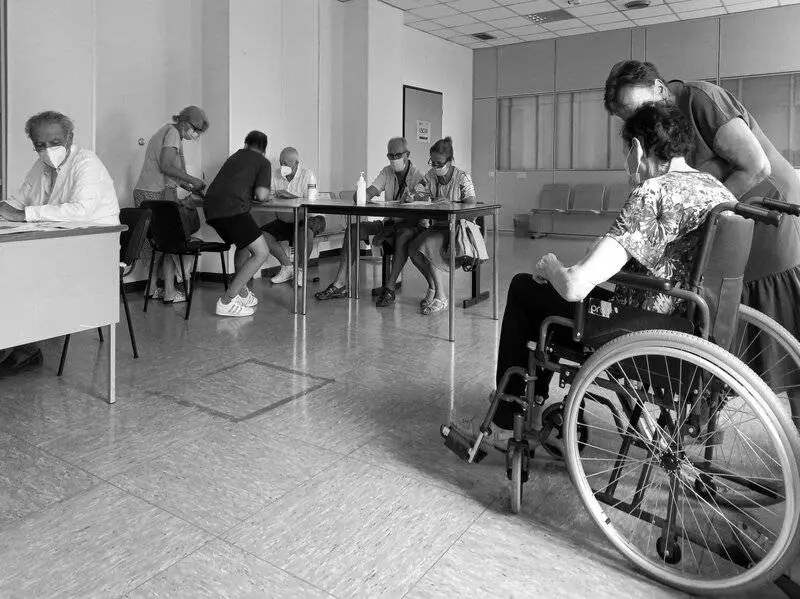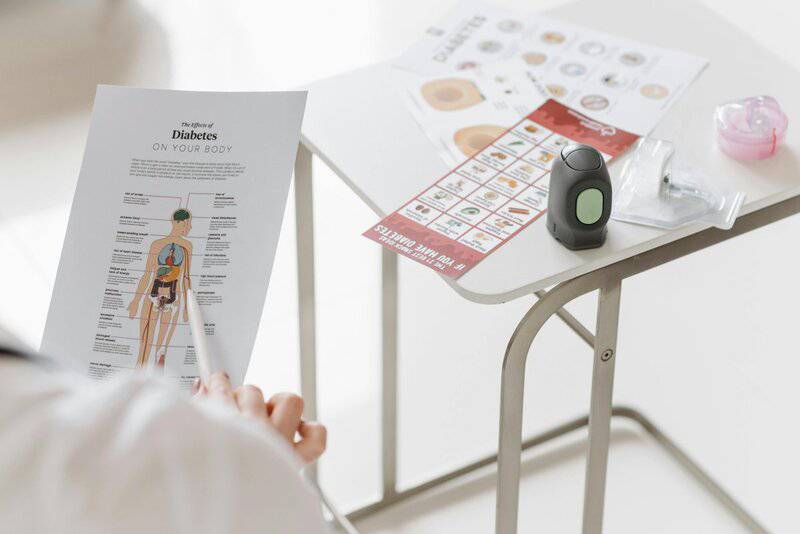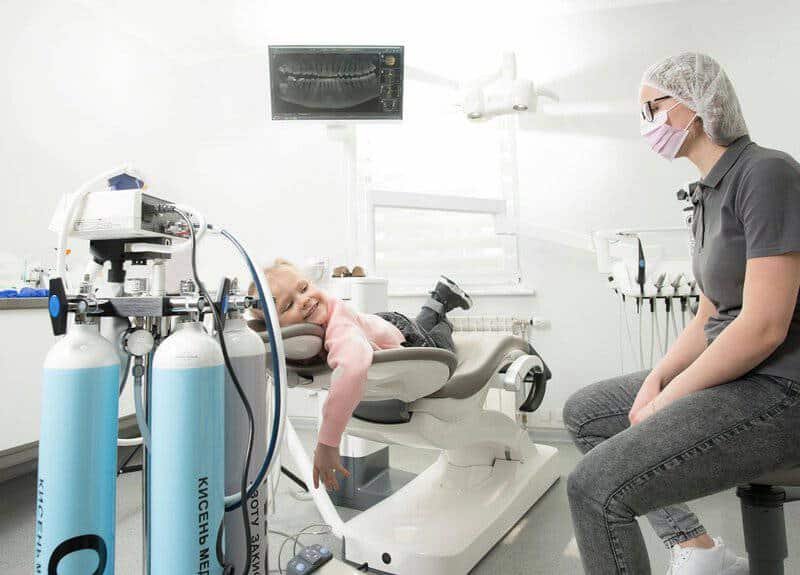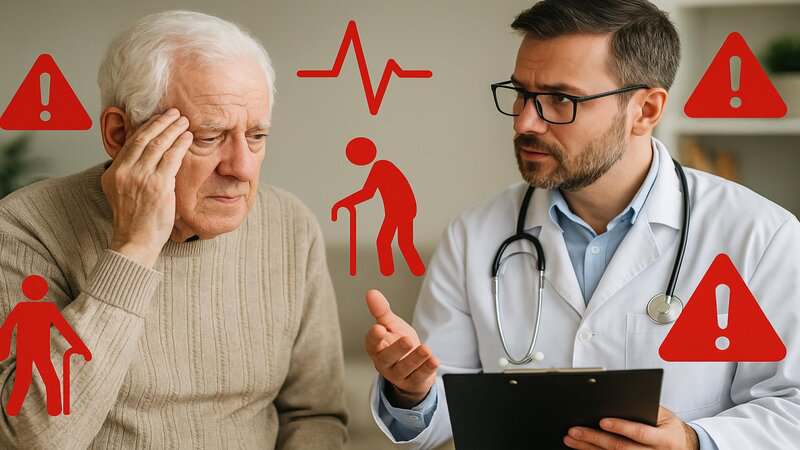Too often, symptoms in older adults are brushed off as inevitable parts of aging. But as a geriatrician, I see firsthand how easily treatable or serious conditions get overlooked when dismissed as “just old age.” While some changes are expected over time, many symptoms—like sudden confusion or unexplained weight loss—are red flags, not normal milestones. It’s crucial to notice these signs instead of ignoring them, as early intervention can dramatically improve quality of life. Recognizing what’s not normal is the first step toward better health as we age.
1. Sudden Memory Loss

While it’s normal to misplace keys once in a while, sudden and significant memory loss is never just aging.
If a loved one forgets familiar faces, gets lost in known places, or can’t recall recent events, it could signal dementia, stroke, or delirium.
These changes often need urgent evaluation.
If memory loss appears abruptly or worsens quickly, seek medical help right away—don’t wait or assume it’s a harmless part of getting older.
2. Unexplained Weight Loss

Losing weight without trying isn’t just a sign of “getting older”—it’s often a warning sign.
Unexplained weight loss in seniors can point to hidden conditions like cancer, thyroid disorders, or even depression.
Don’t ignore a noticeable drop in pounds, especially if appetite or eating habits haven’t changed.
A sudden change like this deserves a thorough medical assessment to uncover and address the root cause early.
3. New or Severe Fatigue

It’s common to feel a bit less energetic with age, but persistent or worsening fatigue should never be ignored.
This kind of tiredness can be a sign of anemia, heart disease, sleep disorders, or even chronic infections.
If someone suddenly struggles to get out of bed or complete daily tasks, it’s time for a medical evaluation.
Don’t assume tiredness is normal—find the underlying cause and get the right support.
4. Shortness of Breath

Feeling winded after climbing stairs isn’t always a simple sign of aging. Unexplained shortness of breath can be a red flag for heart failure, lung disease, or anemia.
If breathing becomes difficult during routine activities or at rest, it’s time to take notice.
This symptom should never be dismissed—it requires prompt medical attention to uncover and treat the underlying problem before it becomes more serious.
5. Chest Pain

Chest pain is never something to shrug off, regardless of age. In older adults, it can signal a heart attack, angina, or other serious heart or lung conditions.
Even mild or fleeting discomfort should be taken seriously.
If you or a loved one experiences chest pain—especially if it’s new, severe, or accompanied by other symptoms—seek emergency medical care immediately to rule out life-threatening issues.
6. New or Worsening Depression

Feeling persistently sad, withdrawn, or hopeless is not just part of getting older. Depression can be triggered by illness, medication side effects, or major life changes.
If you notice a loved one losing interest in activities, withdrawing socially, or expressing despair, don’t dismiss it.
Mental health support is just as important in later years—reach out to a professional for help and guidance.
7. Difficulty Walking or Sudden Mobility Changes

Sudden problems with walking, balance, or frequent falls should never be dismissed as “just old age.”
These symptoms can point to neurological disorders like Parkinson’s disease, side effects from medications, or even an acute illness.
If you notice unexplained changes in mobility or increased unsteadiness, it’s important to consult a healthcare provider right away.
Early intervention can prevent serious injuries and improve long-term function.
8. Incontinence or Changes in Bowel/Bladder Habits

While mild changes can happen over time, sudden incontinence or significant shifts in bowel or bladder habits are never normal parts of aging.
These symptoms may signal urinary tract infections, cancers, or neurological problems.
Don’t feel embarrassed to mention these changes to your doctor.
A thorough evaluation is essential to identify and treat the underlying cause, helping restore comfort and confidence.
9. Persistent Pain

Constant pain—whether in the joints, back, or nerves—should never be accepted as inevitable.
Ongoing discomfort often has treatable causes, from arthritis to nerve compression or undiagnosed injuries.
If pain lingers or worsens, don’t simply chalk it up to age.
A proper diagnosis can lead to effective relief and a better quality of life, so seek medical evaluation for any persistent pain.
10. Sudden Confusion or Delirium

If an older adult becomes acutely confused, disoriented, or experiences rapid shifts in alertness, this is never “just aging.”
Often, these symptoms point to infections (like a UTI), medication reactions, or metabolic imbalances.
Such changes can appear suddenly and may worsen quickly.
11. Vision or Hearing Loss

Not all changes in vision or hearing are simply part of aging.
If there’s a sudden or severe loss, it could be due to cataracts, glaucoma, infections, or even medication side effects.
These issues are often treatable, and early intervention makes a difference.
Don’t ignore rapid changes—schedule an eye or hearing exam promptly to restore quality of life and prevent further complications.
12. Unexplained Bruising or Bleeding

New or frequent bruising or bleeding is a red flag—not just a byproduct of aging skin.
These symptoms can point to blood disorders, medication side effects, or even malignancies.
If you or a loved one notices unexplained marks, nosebleeds, or bleeding gums, seek a prompt medical evaluation.
Don’t dismiss these changes—timely assessment can uncover serious yet treatable conditions.
Tip: Keep a Symptom Diary

One helpful step is to track symptoms as they arise.
Record what happens, when, and any related factors—such as meals, medications, or activities.
A detailed symptom diary can help your healthcare provider identify patterns and pinpoint underlying causes faster.
Bringing this record to appointments ensures nothing is forgotten and supports better, more accurate care decisions.
Tip: Communicate Clearly with Healthcare Providers

When discussing symptoms, give as many details as possible—describe what you’re experiencing, when it started, and how it affects daily life.
Clear, specific information helps healthcare providers make the right diagnosis and offer the best care.
Don’t downplay or gloss over concerns; open communication ensures that important symptoms aren’t missed and can be treated effectively.
Tip: Advocate for Thorough Evaluation

If your symptoms—or those of a loved one—are brushed off as “just old age,” don’t hesitate to ask for a deeper investigation.
Request further tests or specialist referrals when something feels off.
Your voice matters in the healthcare process.
Tip: Review Medications Regularly

Medications can sometimes cause or worsen symptoms through side effects or interactions.
It’s wise to bring all prescriptions, supplements, and over-the-counter medicines to medical appointments for regular review.
A healthcare provider can help identify if new or worsening symptoms are linked to medications.
Regular medication checks are an essential part of staying healthy and preventing avoidable complications.
Tip: Stay Socially Engaged

Maintaining regular social connections isn’t just good for the spirit—it also helps spot early warning signs of mood changes, memory problems, or other health issues.
Friends, family, and community members can notice subtle symptoms that might otherwise go unchecked.
Staying socially active provides emotional support and an extra layer of observation—both important for healthy aging and timely intervention.
Tip: Prioritize Regular Screenings

Routine check-ups and screenings for conditions like high blood pressure, diabetes, cancer, and vision or hearing problems are vital as we age.
These proactive health visits can catch issues early—often before symptoms become noticeable or severe.
Staying up-to-date with recommended screenings gives you the best chance at effective treatment and a longer, healthier life.
Tip: Maintain a Healthy Diet

A balanced, nutritious diet is essential for aging well and preventing symptoms linked to vitamin or mineral deficiencies.
Eating a variety of fruits, vegetables, lean proteins, and whole grains helps support immune health and energy.
Poor nutrition can mimic or worsen many medical conditions, so paying attention to what you eat is a powerful tool for both prevention and early detection of health issues.
Tip: Stay Physically Active

Regular physical activity supports strength, balance, and flexibility, all of which are crucial for healthy aging. Exercise doesn’t have to be intense—even gentle walking, stretching, or light resistance training can make a big difference. Staying active not only boosts well-being but also helps you recognize abnormal changes in mobility or endurance early, so concerns can be addressed promptly.
Tip: Monitor for Changes After Hospitalization

After a hospital stay, pay close attention to any new or worsening symptoms.
Changes in mood, mobility, confusion, or appetite may signal complications, infections, or medication side effects.
Don’t hesitate to report anything unusual to your healthcare provider.
Prompt follow-up can help catch problems early and ensure a safe, steady recovery at home.
Tip: Get Regular Eye and Hearing Checks

Consistent eye and hearing exams are crucial for older adults.
Many vision and hearing problems develop slowly but are often treatable when caught early.
Regular screenings help maintain independence, prevent falls, and improve overall quality of life.
Don’t wait for big changes—make eye and hearing checks a routine part of your healthcare plan.
Tip: Don’t Dismiss Emotional Changes

Emotional shifts like increased anxiety, irritability, or changes in personality are not just “getting older.” These changes can signal underlying medical, neurological, or psychological conditions that deserve attention. If you or a loved one experiences new or worsening emotional symptoms, bring them up with your healthcare provider. Early intervention can make a significant difference in well-being and quality of life.
Tip: Involve Family and Caregivers

Family members and caregivers often notice subtle changes that may go unrecognized by the individual.
Encourage loved ones to help observe and record symptoms, and to communicate any concerns directly to the healthcare team.
Collaboration leads to better care—having multiple perspectives can ensure that important health issues aren’t overlooked and that the right support is provided promptly.
Tip: Educate Yourself About Common Conditions

Taking time to learn about common age-related diseases—like diabetes, heart disease, and dementia—can empower you to spot abnormal symptoms early.
Understanding what’s typical and what’s not helps you advocate for timely care and ask the right questions.
Reliable resources, support groups, and healthcare providers can all aid in building this essential knowledge for healthy aging.
Tip: Stay Hydrated

Proper hydration is often overlooked but is especially important for older adults.
Dehydration can lead to confusion, weakness, dizziness, and other symptoms that might be misattributed to aging.
Make it a habit to drink water regularly throughout the day.
If you notice signs of dehydration, address them promptly—staying hydrated is a simple yet powerful way to support overall health.
Tip: Watch for Subtle Changes

Sometimes, the earliest signs of illness are subtle shifts—like a change in walking speed, increased forgetfulness, or growing withdrawal from activities.
Don’t overlook these minor differences. Careful observation can help identify problems before they become serious.
Discuss any new or recurring changes with your healthcare provider to ensure timely intervention and the best chance for recovery.
Tip: Use Technology for Monitoring

Modern health technology—like wearable devices, mobile apps, and telemedicine—can help older adults and caregivers track symptoms, monitor vital signs, and communicate with healthcare professionals.
These tools make it easier to spot patterns, set reminders, and seek timely advice.
Embracing technology can enhance safety, independence, and peace of mind for both seniors and their families.
Tip: Prepare for Emergencies

Having a clear emergency plan is essential for older adults. Keep updated medical information, medication lists, and emergency contacts in an easily accessible place. If sudden or severe symptoms arise, you’ll be ready to act quickly and communicate vital details to first responders or healthcare providers. Preparation can make all the difference in urgent situations and help ensure the best possible outcome.
Tip: Trust Your Instincts

If you feel that something isn’t right—even if symptoms are subtle or others dismiss your concerns—don’t hesitate to seek medical advice. You know your body best. Listening to your instincts can lead to earlier diagnosis and better outcomes. Never be afraid to speak up and advocate for a thorough evaluation when something feels off.
Conclusion

Growing older does not mean accepting every new symptom as an unavoidable part of aging.
Many health changes in later life are treatable or even preventable if addressed early.
By staying alert, advocating for thorough evaluation, and seeking help when something feels off, you or your loved ones can maintain a higher quality of life.
Never ignore persistent or concerning symptoms—your health and well-being deserve careful attention at every age.
Disclaimer

This article is for informational purposes only and is not a substitute for professional medical advice, diagnosis, or treatment.
Always consult your healthcare provider with questions or concerns about symptoms. Your health decisions matter—reach out when in doubt.



Vielleicht interessiert es Sie:
13 Extraordinary Giants Ready to Blow Your Mind! 🌍
10 Chonky Oddities That Will Leave You Speechless! 🤯
9 Unbelievable Absolute Units That Will Leave You Speechless! 🌟
10 Colossal Creatures That Will Leave You Speechless! 🐻
12 Shocking Absolute Units You’ll Have to See! 😲
12 Epic Absolute Units That Will Challenge Your Perceptions! 🔥
Uncover the 11 Ultimate Massive Oddities That Awe! 🌍
9 Unbelievable Oddities That Redefine ‚Massive‘! 🐉💎